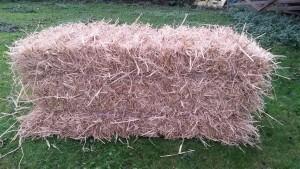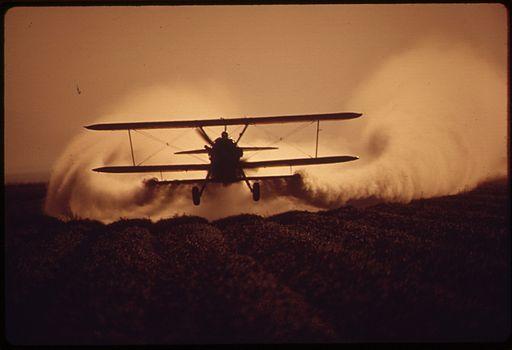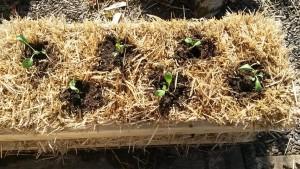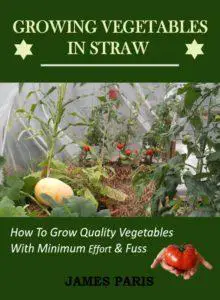Can Genetically Modified Straw Be Safely Used For Straw Bale Gardens?

The mere mention of genetically modified straw being used for straw bale gardening, is enough to make most permaculture enthusiasts swoon into the compost heap 🙂 And to be fair, it certainly does not sound like such a great idea, after all it goes against all the principles of permaculture and growing organic veggies does it not?
For myself, I grow organically whenever I can. By this I mean that I use home-made pesticides, I feed my plants with organic tea’s and animal manure (herbivores only), and generally try to ensure my veggies are grown using natural methods such as companion planting.
(herbivores only), and generally try to ensure my veggies are grown using natural methods such as companion planting.
However I do not take an ‘organic or nothing’ stance. I will resort to drastic man-made measures if the occasion demands.
For this reason I thought I would have a closer look at the issues involved when talking of GM Crops, and analyse from a layman’s point of view whether using GM straw bales for my bale garden would have a detrimental effect on the vegetables I am growing.
Be warned – my conclusion may surprise or even annoy you 🙂
GM Crops – The Issues
As I see it there are 2 main issues (there’s lots I know) surrounding the use of GM straw in straw bale gardening. These are in a nut-shell, the following..
The Ethical/Moral issue: The use of genetically modified crops is against nature and will destroy the planet, as well as bring the people into slavery to the massive corporations such as Monsanto that aim to control the worlds food source.
The second regards Practical/Material concerns: What are the long-term medical consequences of consuming GM foods – will it alter our own DNA and leave us vulnerable to disease or any number of medical conditions? Will these GM crops corrupt the natural stock and ultimately leave us with only GM crops?
Now here’s the thing – Only one of these issues need concern the Straw Bale Gardener, and that is the moral/ethical issue.
Why? Because the use of GM material for composting is means that the DNA is completely broken down and altered as part of the decomposition process.
The growing vegetables or other plants are feeding on the minerals produced as a part of this process. They do not add the DNA of any of the plants composting to their own DNA.
If this were the case, the whole eco system would have broken down millennia ago and there would not be such a thing as individual plants, just one bastard plant ( I’m not swearing here honest) that was a mix of everything on the planet!
But What About The Chemicals?

Ah well, that is a different issue altogether. Let me explain.
Chemical fertilizers and herbicides are used on a massive scale in modern farming today. Rather than feed the soil, which is the long term sustainable option. Modern farmers simply pump the chemicals directly to the plant (in effect) year after year to achieve quick results.
Add to this chemicals such as calcium carbide and ethylene to the promote ripening of fruits such as bananas, and the desiccation of cereal crops (a process to speed up drying for an earlier/even harvest) with chemicals such as glyphosate, the active chemical in Roundup – and you can easily see a problem for the organically concerned gardener or indeed consumer.
However the fact is that it is not only GM harvests that are prone to this chemical treatment. All modern food harvests unless they are specifically organic in nature, are likely to have been sprayed throughout the growing process and as such are prone to chemical contamination at some level.
Should GM Bales Concern The Straw Bale Gardener?
Well to my mind, if you are at all concerned about organic issues, then it should of course concern anyone with a care for the environment and what we all consume on a daily basis.
Regarding the straw (or hay) in the bales though, is it likely to be contaminated to such an extent that the chemicals will leach into our plants..hmmm.
The Process
The actual processes of fertilization, herbicides and pest control has continued throughout the life of the cereal crops that we may be using for our straw bale garden.
The last process regarding the desiccation discussed earlier, used on Potatoes, cereals, canola and pulses, should have been performed between 7- 21 days before harvest.
The big question is just how much of all this chemical treatment is present in our straw bale, and will the plants planted therein soak them up and transfer them into the food chain?
This is not an easy question to answer, as so much depends on the individual methods/chemicals used, as well as weather and other farming methods incorporated. However here is my slant on it for what it is worth.
First of all I am of course concerned with the amount of trace chemicals to be found in the food chain. It is quite disturbing to say the least – hence my leaning towards organic farming methods.
However that issue concerns food that has been ‘contaminated’ at source and directly ingested. When we consider the whole issue of growing vegetables in straw or hay bales, we are ultimately consuming veggies that have been grown in straw – the remnants of barley, wheat, rye or whatever.
To state the obvious – we are not consuming the straw!
But what about chemical leakage from the straw you may well ask, will it not contaminate the vegetables grown in it?
Ok, let’s look at the process again.
You have purchased your bale sometime after the harvest is in. That means that you more than likely will not be growing anything in it for a few months, after all it’s at or near the end of the growing season.
So your straw has probably been washed on while standing in the field, removing some of the contaminants. By the time you get to using the bale for planting it may have been sitting for several months – more contaminants removed. Possibly exposed to the weather outside – more washing out of toxins.
Before the bale is used to plant your veggies, it is thoroughly soaked with water for 10-14 days – more impurities removed. Though to be fair you are adding nitrogen to the water to activate the bale.
The composting process as the straw heats up during the straw bale preparation removes even more possible toxins that may or may not be present in the straw.
My Conclusion:
Could there be trace elements or contaminants still in the straw after all this process – yes of course there could be. In fact it’s more than possible. But is it enough to cause any real concern for the straw bale gardener?
For me personally, and the end result of my journey to discover the realities of possible contamination of my straw bales.
I have come to the conclusion that whether through the GM issue or just straight contamination via modern farming methods – Even choosing bales of straw ‘contaminated’ by modern farming methods – it is not something I will worry about.
All you permaculture folks – please don’t hate me 🙂
The fact is that even though I am against GM crops for many reasons, and I promote the use of permaculture in general, If I cannot source organic bales (good luck with that one!) then I have no problem using GM straw or straw bales produced through modern farming methods – for all the reasons mentioned.
What do you think? Please feel free to comment below. My readers and I would welcome the input.
Meanwhile here are a couple of links if you would like more details regarding GM crops and modern chemical farming methods.
Darcof, on Composting and DNA
Wikipedia, on Genetically Modified Crops
Wikipedia on Genetically modified food controversies
Composting Council: Persistent Herbicide FAQ’s
Disclaimer: This article expresses my personal opinion only and it not intended to be professional advice on the issues regarding GM crops or chemical farming methods. Please consult the relevant authorities regarding these issues.



